|
First of all, the small announcement. If you are a lover of pizza, and have always wanted to make your own, please join me over at www.FreeThePizza.com. It’s fun, and there’s a free chapter from the forthcoming Free The Pizza book that includes a free dough recipe. Just look for the button, “Free dough recipe.”
Now, word for today is, “Hiatus.” The word hiatus represents a gap. I hear about gaps, and the first two things I think of are 1) The Gap, a clothing store founded in 1969 selling only Levi’s jeans and LP records. You would more likely know the grown version of this store as GAP, which looks nothing like its former self and is a company that also owns Banana Republic, a company which also looks nothing like its former self when it was selling funky safari and travel clothing to people whose lives had an enormous gap between themselves and safaris. What’s nice about the word hiatus is its optimism. A gap always has something on the other side. More to come! A phrase made popular by the London Underground, “Mind the gap,” is a polite way of giving the order, “Watch your step.” And since you’re getting on a train, you’re going somewhere. Maybe it’s good, and you will be back. Interestingly, the etymology of the word “hiatus” stems from 16th century Latin, and literally means “gaping.” As in, there’s a gaping hole in your resume during those three years when you stopped selling shoes Santa Monica and lived in a smelly, pseudo ashram in Pacoima. (“Pseudo” and “Pacoima,” two P-words that have nothing to do with each other in any way, including pronunciation of the “P.”) A hiatus sounds more optimistic than anything that’s gaping. So that is what I am presenting to you today: your relentless scribe’s announcement of hiatus. Things are changing rapidly in our post-COVID lives. In order to serve you better, we will be closing the doors on Words Good for the time being. When we return, it will be Big. In the meantime, feel free to ankle on over to Slow Burn Marketing’s new brand for all things related to homemade pizza at Free The Pizza dot com. You can get an occasional dose of wordy weirdness right there. Thanks for playing! Cheers, Blaine Parker Your Lean, Mean Creative Director in Park City LIGHTNING BRANDING ON AMAZON The Kindle edition of our new book is now available at Amazon for the REDUCED bargain price of $9.95 For details about our new Lightning Branding courses, both do-it-yourself and we-do-it-with-you editions, click here. (There's even a video of us!)
0 Comments
Your relentless scribe was seeking the etymology of the word, “baffle.” As in, “I am baffled by that commercial where Matthew MaConaughey is coming down from airless space in a hot air balloon and yelling at everybody and wow, what a case of hat head he has.” (Seriously, Go back and look at it.)
And really, you could point to half a dozen commercials from yesterday’s Big Game and say, “What was THAT? I’m baffled!” However, I’m finding myself baffled by the etymology of the word “baffle” vis-à-vis, “to perplex.” Yes, one can draw inferences about how we got from the technical idea of bafflement to perplexity. But we want a concrete and definitive answer here. So, as I’m scratching my head and perplexing over baffle and finding sudden joy in the word being an obsolete seaman’s term for "winds that blow variously, making headway difficult" (and boy have I been there, literally as well as metaphorically), I’ve stumbled upon another word that has often forced me to wonder, “Where does that come from?” Hello, “Hoodwinked”! As in, “I’m feeling hoodwinked that my tax dollars were used to buy a spot in The Big Game to tell me to get fake vaccinated!” (No, I’m not an anti-vaxxer or a fake-newser, but someone out there is one or both, so it just seems fair to provide equal time as the federal government used to mandate that broadcasters do when delivering political messages. But I digress.) Hoodwink! The meaning? To deceive! How topical that is in our culture of fake news during the Big Game in The Violent Hell That Is Now Los Angeles. I mean, who’s even sure the Tampa Bay Buccaneers actually won the game last night? No, you didn’t see them on the field. But people are talking about it. The alternate universe in which the Bengals won the game is a place rife with advocacy sports journalism and deadly blunt blather. Blather! There’s a word we have to research. Well, no we don’t. It’s easy. It comes from the Old Norse, “blathara,” meaning to talk nonsense. Sometimes those Scandinavians get it right, the Saab 9-7X SUV built in Ohio notwithstanding. But all that and other nonsense aside, including those half a dozen head scratching “messages” from the Big Game Advertising Abyss of last night, where advertisers left you baffled if not feeling hoodwinked, you need (need!) to know that the word “hoodwink” hails from a different time altogether. Today, "hoodwink" is a laughable way of talking about a scam as if one is a Dead End Kid from a 1940s black & white movie. Hoodwinking actually comes to us from the age of the highwaymen. And no, not the Scarlet Pimpernel kind of Hollywood movie highwaymen where there’s a guy who isn’t really a fop and isn’t really a bandit and a woman who’s disgusted by his foppish fake side yet lusts after his fake alter ego. No, you bet your bloomers not. We’re talking real, dangerous, rob you and possibly kill you as opposed to romancing you highwaymen. And imagine my surprise! The word “Hoodwink” is a mashup (though they didn’t have that mashed-up term in the days of the highwaymen) of the words “hood” and “wink.” Insert GASP here! The "hood" part is The Bag. The highwayman would put The Bag over your head so you could see neither his face nor what he was doing nor what advertiser he was doing it for. (For some reason, back then they always stitched the corporate logo over the left breast of the highwayman's dashing if impractical cape. Why?!) The "wink" part is another headscratcher. That’s until you realize that back in the days of the highwaymen, when the highways were merely dirt doubletrack instead of the paved and crumbling coast-to-coast infrastructure dangerway networks we have now, the word “wink” meant something different. Today, we see a wink as a closing of one eye to demonstrate complicity or a mutual secret. However, the obsolete meaning of “wink” is to literally close one’s eyes. Yes, both of 'em. So being hoodwinked means having one’s eyes effectively closed involuntarily by a bag over the head. (I’m hoping that bag was made of a coarse-weave fabric so as to facilitate breathing. Today, it could easily be a plastic bag from a big-box Big Game advertiser store and would kill you as soon as blow away and mercilessly pollute your fisheries. But again: I digress.) So, the hoodwink, while today being seen as a somewhat dated word meaning to run a scam on someone, actually stems from a literal obstruction of one's vision via a hood. So if your bafflement over the blather of the adversphere of the Big Game was more than you bargained for, take solace in knowing that at least some things really are as simple as they seem and don’t require deep investigation, especially when they weren’t keeping you up at night to begin with. Now baffle my blather, baby! Cheers, Blaine Parker Your Lean, Mean Creative Director in Park City LIGHTNING BRANDING ON AMAZON The Kindle edition of our new book is now available at Amazon for the REDUCED bargain price of $9.95 For details about our new Lightning Branding courses, both do-it-yourself and we-do-it-with-you editions, click here. (There's even a video of us!) Word: Procrastinate.
We use it all the time. Do we really know what it means? Here ya go. Strap in and hang on to your late 16th century Latin. It literally means “deferred until morning.” It comes from the verb procrastinare, derived from the prefix “pro,” meaning “forward,” and the word “crastinus” meaning “belonging to tomorrow.” Break that latter word down a bit, and you find “cras” is the Latin word for “tomorrow.” You getting this? There's more. Or shall we table it until morning? Cheers, Blaine Parker Your Lean, Mean Creative Director in Park City LIGHTNING BRANDING ON AMAZON The Kindle edition of our new book is now available at Amazon for the REDUCED bargain price of $9.95 For details about our new Lightning Branding courses, both do-it-yourself and we-do-it-with-you editions, click here. (There's even a video of us!) Snark abounds. Is there a medical treatment for that?
A friend of mine has landed in the hospital. I’m feeling for him, and I’m also feeling remiss. For many weeks, I’ve been thinking I owe him a phone call to banter about life, the universe and everything. Then, this happened. Among other things, he’s having trouble with his speech. And I’m sitting here, thinking, Wow. These are the moments where one castigates oneself for not being a better friend. Come to find out, one of the things my buddy enjoys about our calls is the snarky tenor of the conversation. I’m humbled, as he is easily more skilled at snark than I. But that tidbit got me thinking about the word, “snarky.” What does it really mean? Is it a good thing? What is the etymology? The first time I recall hearing the word in regard to myself was during my foray into standup comedy during the 1990s. I was alternately referred to as “snarky” and as a “poor man’s Dennis Miller.” The latter might be a snarky compliment, but I’m not sure. But I do know that my ailing friend’s hair is more like Dennis Miler’s 1990’s hair than my own ever was. Mine lacks the ability to bounce and behave like a 1960’s TV shampoo model. That notwithstanding, our respective levels of snark seem to be about even. But anyway, the etymology of “snarky.” First, the word means “critical or mocking in an indirect or sarcastic way.” OK. Flattering. But it gets less so. “Bad tempered or irritable.” Eegad. I don’t want to be that person. So, where does this all come from? Root words for snarky date from the 1800s, including “nag,” and literally, “to snort.” Pht. But most interesting is the British slang word “narky,” from the earlier word “nark,” which means an “annoying, unpleasant or quarrelsome person.” And then, it gets even more unflattering. “Nark” is a verb dating to 1859, meaning “to act as a police informer.” All of this probably comes from the Romany word “nak” for “nose.” Now, I’m no nark, a word I always assumed was a product of the 1960s hippie culture and was spelled “narc.” It’s not. I’m also pretty sure my friend is no nark, either. And the word is more likely related to the idea of sticking your nose in where it doesn’t belong. And to become even more twisted, it may also have a similar root word in Sanskrit. That’s the language we usually associate with Nirvana (the state of being, not the grunge band) and attempting to attain true enlightenment. And the latter desire often has something to do with misguided Nirvana seekers and their controlled substances about whom one narks to the narcs, eh? This is so complicated and unseemly. And all I know is I’m now questioning how much snarking I want to be known for, as it comes at a price. Sarcasm and its cousin, satire, are often misunderstood. But as an often misunderstood lawyer to whom I was recently speaking said, “Dude!” (Yes, he said “Dude!”) “Dude! We all grew up reading Mark Twain and Mad Magazine! This us what you get from us!” There’s a reason The Fabulous Honey Parker and I have enjoyed working with lawyers at Slow Burn Marketing. They’re often smart people for whom snark abounds. But anyway, my being snarky is something my medically inconvenienced friend enjoys. So perhaps he’ll appreciate this snarky madness from his hospital bed. And if you, faithful reader, have a new and useful perspective on things snarky that you find helpful in any way, well, that’s a bonus for me. Proud to serve. I look forward to seeing you further in the snarky ether, seeking true ill-tempered enlightenment at the ends of our Romany noses. Cheers, Blaine Parker Your Lean, Mean Creative Director in Park City LIGHTNING BRANDING ON AMAZON The Kindle edition of our new book is now available at Amazon for the REDUCED bargain price of $9.95 For details about our new Lightning Branding courses, both do-it-yourself and we-do-it-with-you editions, click here. (There's even a video of us!) Wahoos For yahoos?
In a retail store along the Mississippi Gulf Coast, I recently picked up a free fishing magazine. It’s called Coastal Angler. I’m not much of an angler myself. More of a dabbler. Perhaps, in the land of contraction-based words, that makes me a dangler? So many questions. Anyway… The headline on the cover is, “WINTERTIME WAHOO.” The cover photo shows a small, lean and happy woman hoisting an enormous, lean and unhappy fish. I was looking at this photo and wondering for perhaps the umpteenth time (where did we get that number, anyway?) how did the wahoo get its name? With you in mind, dear reader, this seemed like a good time to solve such a mystery. I went to everyone’s favorite source of demystification, Google. (Google’s name is a purposeful misspelling of the word “googol,” in case you’re interested. Where better to wonder about wahoo than Google standing in for googol? And unlike umpteen, googol actually is a defined number--a one followed by 100 zeroes. But I digress…) The word “wahoo” has many meanings. But the origin of the fish’s name was listed as “unknown.” That said, wahoo is also listed as a synonym for “yahoo.” Yahoo is defined as either an exclamation of great joy or a person who is rude and violent, as in “Every Sunday, this fishing spot is all wahoo for yahoos and it gets ugly.” (Interestingly, Yahoo was a favored search engine for a time before the yahoos over at the misspelled googol usurped their position of hierarchy. Wahoo for them!) After also failing at etymology from a formal resource (namely, an actual dictionary like Merriam-Webster, who merely defines the fish as “a large, vigorous mackerel), I defaulted to the next best resource for all things large, vigorous and etymological, the Hawaii Seafood Council. Who better to ask about the etymology of the word wahoo than the people who call wahoo by the word “ono.” As in, “Ono, some yahoo is asking about wahoo again.” If you care, the word ono is Hawaiian and means “good to eat.” As in, “Ono? Oh yeah! Yahoo, we’re having wahoo again!” But the early European explorers responsible for calling the fish by the name “wahoo” were not hip to the jive in Hawaii. But they did recognize that ono were plentiful off the island of Oahu. (Ono, see where this is going?) A common spelling of Oahu on early maps was (yes) “Wahoo.” And in a nutshell, there’s your folk etymology in action. Ono is very big at sushi restaurants. It is prized. I’ve never heard it called by the name wahoo, probably because of branding problems. Who wants to mortgage the house for two slivers of wahoo? It sounds like a kid’s party favor. Or a service one might acquire from a professional woman. "Hey, baby, how much for wahoo all night long?" Ick. But now that I know about the etymology, I will begin asking my sushi chef if he has any large, vigorous mackerel. If he says yes, I will exclaim, “Yahoo!” as I order my wahoo and hope that I am not mistaken for a vigorous and violent dangler. Cheers, Blaine Parker Your Lean, Mean Creative Director in Park City LIGHTNING BRANDING ON AMAZON The Kindle edition of our new book is now available at Amazon for the REDUCED bargain price of $9.95 For details about our new Lightning Branding courses, both do-it-yourself and we-do-it-with-you editions, click here. (There's even a video of us!) Are your words saying the same thing as your pictures?
One of the joys of living in a tiny TV market and watching local broadcast is having a good laugh at the expense of local advertisers. Granted, the advertisers may not see it that way. And yes, you may identify this unflattering indulgence as a case of schadenfreude. (Maybe that should be a Words Good Good Word Of The Week?) Schadenfreude, a delightful sounding German word for delighting in the pain of others is a morbid and mirthful time for everyone but the most conscientious and uncorrupt. But let’s face it: there are really only three good alternatives here. 1) Cry. 2) Stop watching. 3) Call the business and offer to fix their advertising. Since I‘m a cold-hearted human whose tear ducts have been paved over, crying is out. To stop watching would require initiative to do something else, and I’m inherently lazy. And being afflicted by a non-enterprising, introverted kind of lazy means I’m not reaching out to anybody I don’t have to. I’d rather gouge out my own eyes with grapefruit spoons. So, hello schadenfreude! Anyway, there’s a local funeral home that advertises on TV with some frequency. Their ad copy says what you expect: all the normal loads of caring, compassionate boilerplate. Most of the words talk about sincerity and sympathy and such. Then there’s the swimming pool and the alcohol. Yes, the image that is firmly cemented into my gray matter is the shot of the men in the family who run this caring and compassionate concern gathered around a poolside patio table with cold, frosty beer. Nothing in funeral service advertising speaks to caring and compassion like backyard swimming pools and cold beer. Now, shall I play devil’s advocate? The message sent by the cold, frosty beer is this: “If it matters to you, we are not Baptists.” And granted, there might be some method to that madness. If the receptionist at the funeral home is tired of answering every caller’s first question by saying, “Sorry, we are not Baptists,” that cold frosty beer by the pool is a good way to qualify the prospect before they ever pick up the phone. That insane bit of possible genius notwithstanding… As you know, when writing advertising, the single most important person in the message is the customer. In my humble if hyper-enthusiastic opinion, the best funeral advertising of all time is the Forest Lawn radio of years ago in Southern California. The campaign was called, I believe, “Celebrate A Life.” Each commercial was a monologue by someone fondly remembering a deceased friend or family member, and how incredible and joyous the sendoff was. I’ve never heard any advertisement that made me say, “Wow, I wish I could be that dead guy.” But this came close. (Talk about the opposite of schadenfreude!) Ya know what those Forest Lawn commercials never said? “And we chose Forest Lawn because the entire funeral home family likes to drink frosty cold beer around the backyard pool paid for by my funeral dollars.” Watch the words that are going with your pictures. Words and picture must complement each other. It doesn’t matter whether they’re on the screen or in your listener’s mind. The words might be good. But something in the equation might be bad. Unless, maybe, there’s a madness method afoot. Words good. Madness thoughtful? Cheers, Blaine Parker Your Lean, Mean Creative Director in Park City LIGHTNING BRANDING ON AMAZON The Kindle edition of our new book is now available at Amazon for the REDUCED bargain price of $9.95 For details about our new Lightning Branding courses, both do-it-yourself and we-do-it-with-you editions, click here. (There's even a video of us!) What the pampootie?!
Yes, Random Words Good Good Word Of The Day is: Pampootie. The Pampootie is neither an off-brand disposable diaper nor the requisite, frivolous second-act show tune from a failed Broadway musical. Pampootie is a kind of footwear. And probably not the quality footwear blessed by St. Hubbins. (If you get the reference, you know who you are and probably saw such shoes dancing around Stonehenge. But I digress.) Pampooties come to the world from their humble origins in the Aran Islands of County Galway, Ireland. It’s a sort of medieval pre-tech footwear of the kind nobody ever stood in line for as if they were Air Jordans. In fact, there’s a good chance nobody ever really wanted pampooties at all, as they were prone to rot. As the shoes were made from untanned hide, Ireland’s damp climate could wreak havoc upon the footwear of the populous. A new pair of pampooties were expected to last about a month. Moreover, the pampootie was made from the more sturdy hide of the animal’s buttocks, so there’s that. Instead of Air Jordans, it seems doubtful anyone was marketing Air Buttocks. And with a life expectancy of a month only, how often would the styles be changing and the kids demanding their new Air Buttocks? “Mom! I needs me some new Air Buttocks! Seamus next door already has his, and they have the awesome new butt-hair soles!” Yes, early footwear innovation: the pampootie was often made with the hair of the buttocks left on the sole for better traction. Held together with twine or a leather strap, the pampootie is the forerunner of a shoe you may have seen in action, though may not have known as ghillies. Remember these are shoes as opposed to the suits worn by special forces soldiers as camouflage. Effective at hiding from the enemy, the ghillie suit is hard to dance in. And dancing is where you’d have seen the ghillie shoes. You’d have witnessed these shoes in action as the official Air Dance footwear of a touring company that dances up a Celtic storm, forcefully slapping the stage with their modern Air Buttocks slap shoes. Yes, the butt hair may have been replaced with rubber for purposes of contemporary convenience, making one wonder whether that rubber comes from the bouncy buttocks of the rubber tree and is the hair that’s not used for the shoe instead used to stuff pillows? Hard to know. But one can probably rest assured that the butt-rubber soles are better for dancing with abandon. Um, how did we get here? Oh, yes, Random Words Good Good Word Of The Day: Pampootie. Put that in your pampootie and kick it. Cheers, Blaine Parker Your Lean, Mean Creative Director in Park City LIGHTNING BRANDING ON AMAZON The Kindle edition of our new book is now available at Amazon for the REDUCED bargain price of $9.95 For details about our new Lightning Branding courses, both do-it-yourself and we-do-it-with-you editions, click here. (There's even a video of us!) Going Down The Truth Hole!
So, your manic scribe was digging for a good word to kick off the new year, and found it deep within a pulp novel. (Only the finest resources for you, dear reader, yes indeed.) The word that plucked my resonant chord last night was a very vivacious V-word: verisimilitude. Ah, yes, you’re saying to yourself. Verisimilitude. Um…what does it mean? Verisimilitude is the appearance of being true or real. The word is birthed to us by that maternity ward of so much English vocabulary, Latin. Specifically, we’re talking 17th century Latin in the nascent form of verisimilitudo (which, admit it, is more fun to say), a word derived from the parental units of verisimilis, meaning “probable,” in turn born of veri, a genitive form of verus, meaning “true,” and the word similis, meaning “like.” Dude, it’s true like! And if you’re anything like me, you’re getting sidetracked by the word “genitive,” which is an adjective indicating close associations between nouns and pronouns, and now knowing about those close associations, one is forced to speculate whether they’re standing at least six feet apart and wearing masks. But I digress. “Verisimilitude” is a good word hampered by an unfortunate gymnastic quality that makes it unwieldy. As much as one might like to trot it around in 2022, it’s going to stumble and stagger. It doesn’t just roll off the tongue. Now, in the realm of science philosophy, a synonym for “verisimilitude” is “truthlikeness.” Blech. That has no jazz hands whatsoever. Plus, it sounds made up. If we’re going to sound made up, let’s go for a truly made up word like “Truthiness.” Just one problem. The word truthiness is not a synonym for verisimilitude. It’s an antonym. It’s the appearance of truth with nothing to back it up. The word was coined by comedian Stephen Colbert in the age of The Colbert Report. And how ironic is it that the news satire show that became America’s most trusted news source gives the culture a truthy word to describe fake truth? These days, problem of truthiness abounds. Yesterday, I was listening to a news story about a family split between verisimilitude and truthiness. A young man who’s a professional journalist is required to source verifiable facts in his reporting. He also can’t persuade his mother that his verifiable facts are truth that counter the bald-faced BS of her favored if unverifiable political truthiness. She in turn pities her son’s belief in facts over fiction. What’s a mother’s son to do? If a dark age is characterized by belief in unsubstantiated claims and debates about the number of angels cavorting about the dual pinheads of government and science, well goodbye year of living in truthiness! Anyway, circling back to our original challenge… Verisimilitude seems like a good place to start in 2022, even if the word doesn’t quite roll off the tongue. For that quality, maybe we should look to its harder edged cousin, “Veracity.” Since veracity regards accuracy and conformity to facts, it seems like a good place to settle when looking forward to a new year with hopes of shining intellectual light on the darkened lunacy that abounded in 2021. A return to civility predicated on truth is my hope for the year ahead. But just in case, I still have last years’ brickbat helmet standing by… Cheers, Blaine Parker Your Lean, Mean Creative Director in Park City LIGHTNING BRANDING ON AMAZON The Kindle edition of our new book is now available at Amazon for the REDUCED bargain price of $9.95 For details about our new Lightning Branding courses, both do-it-yourself and we-do-it-with-you editions, click here. (There's even a video of us!) From “The Chronicles Of I Research These Things So You Don’t Have To…”
Yes, it’s another tale of word curmudgeon detectiveology to help answer the unanswerably nagging question: “What the hell happened?” In this episode: Super Adverb! Yes, it’s possible that you’ve turned a deaf ear to “awesome,” “amazeballs” and “awesomesauce,” but your camel’s back has broken beneath the straw of ultra-awesomeness in the attack of the adverb, “super.” If you’ve wondered how this all happened, I believe I may have discovered the culprit in the great super avalanche (superlanch?) of the 21st century. Ready? Tinder Did It! The super-ubiquitous dating app first introduced the phrase “swipe left” as an all-purpose metaphor for dismissing someone as unsuitable. And then, Tinder brought us the ridiculousness of supersizing that which does not require it. The great day of the super-stupidsizing was September 9, 2015. That is the day that Tinder introduced a new button designed to help one express, to an extreme degree, their attraction to a prospective bedfellow, er, hookup, er, partner (there we go!) by clicking on a new button that expresses more than mere “like.” The new button of 2015 was “Super Like.” And who doesn’t want to be Super Liked? Moreover, Tinder assures us that by using this button, “The person you Super Liked will take notice.” (This button is not merely a thumbs-up or a double thumbs-up or an amazeballs emoji, but a blue star which looks vaguely like a puckered blue orifice—and who doesn’t super like that?) With apologies to the geniuses who have made Tinder so super successful that it surpasses Netflix in terms of subscriber dollars spent: we must take notice that being super-liked is super-silly. Is merely liking something or someone no longer sufficient? Why is adding one’s own words too much? Is it that it requires a) thought and b) words? Clearly, there is an excessive burden presented by the time that original thought robs from one who is attempting to thumb-like as many prospective bed buddies as possible in one session of swipe-and-tap date shopping by phone in the worst possible evolution of mail-order assignation (a new term I’ve just invented, what with mail-order bride-ness now being antiquated and beyond sexist and super-laughable, as how does one attach a bride or a groom to an email?). And yes, faithful reader, you will notice that some of the sentences herein are super-complex. They’re violating your faithful scribe’s borrowed dictum from David Ogilvy, to wit: thou shalt not write any sentence longer than 13 words. But this verbal violation seems super necessary at this super moment in history where our language is being super bogged down by the superlative double whammy of ambiguous, confusing, style-abhorrent, non-agreeing if gender-neutral pronouns and the invasion of super ridiculous, tech-bred speakiness into the vernacular. Majorly un-cool, dudes and dudettes. What can be done? How about we super-investigate superalternatives to super-izing everything? Quick! Rush to the rescue station! Break the glass on the emergency super-thesaurus case and thumb over to words like “superbly,” “superlatively,” and “superly” (the latter being super-awful sounding but at least a legitimate word). Or, better yet, forget the thesaurus entirely. Instead, when someone uses “super” in a capacity that you might deem ill-advised, turn it back on them. “Did you just say your steak is super amazing? “Does that mean the great surprise and astonishment of mere amazement is insufficient to describe the power of that char-broiled beef upon your palate? “How much more transported beyond simple astonishment are you? “Will your spirit be leaving your body here at the table, requiring the bus boy to clear away your limp and lifeless carcass? “Or will your head simply fly from your neck, which will then shower us all in bloody amazeballs? “Or, is it simple enough that we should just go find you an adult diaper? How super amazing is it going to get and do I need a plastic sheet as if I were in the front row at a performance by that comedian who uses a giant mallet to smash watermelons? "Explain thyself, dear friend.” OK. Perhaps that is excessive. Here’s another idea: let’s place a moratorium on adverbs. They’re often the majorly weakest part of verbal expression. Writing and speaking free from adverbs is potent. And maybe the example can leach into the culture. Perhaps the thoughtless offenders of superdom will notice they sound out of step. They’ll reevaluate the awesomeness of their word choices. But I super doubt it. Until the superstorm passes, we will have to suffer the foolishness. Super swipe left. Cheers, Blaine Parker Your Lean, Mean Creative Director in Park City LIGHTNING BRANDING ON AMAZON The Kindle edition of our new book is now available at Amazon for the REDUCED bargain price of $9.95 For details about our new Lightning Branding courses, both do-it-yourself and we-do-it-with-you editions, click here. (There's even a video of us!) The Foreign Invasion: They Live Among Us!
The words, that is. Foreign words live among us insomuch as language is alive. (That’s versus not “dead,” e.g. Latin, Sanskrit, Coptic, Akkadian, et. al.) Invaders of the day? The word “stereo,” which means “solid,” the word “truck,” which means “barter,” and a New Orleans idiom for going to the supermarket, “Makin’ groceries.” Nothing in the lexicon of United States English is as it seems. Our language is a pastiche of foreign words and phrases and translations that have invaded the zeitgeist at various times and have been assimilated for whatever reason. This vocabularic cultural habit makes English, especially our brand of it, a nightmare for the foreign speaker who has to navigate the minefield of explosive idiom with care and dexterity lest they be blown to bits by a metaphorical munition that meant no harm but destroyed an otherwise perfectly passive thought. Why is your relentless scribe ranting about all this? It began while thinking about good words for Words Good. That’s where “stereo” came into the equation. Back in the day, when high-end stereo equipment was part of my professional life, the word’s etymology was a revelation. Learning that the word has nothing to do with “two” (as in a pair of stereo speakers), and everything to do with creating a solid portrayal of sonic reality made new sense. This simple tidbit changed my understanding of both the medium and of my job. The word “stereo” comes from the Greek word, “στέρεο.” Go ahead and plug that startling little collection of characters into Google Translate. Google’s polyglot gods of everything will tell you that the word means “solid.” (And if you ask Google to pronounce the word, it sounds oddly like "stereo.") The other part of the entire original word, “phonic,” as in “stereophonic” (we Americans love to truncate everything to prevent our tongues from tiring on polysyllabic overwork) means “sound.” A solid sound. Real. With length, width, depth and dimension. The word “stereophonic” was given to us by the American electrical engineering and manufacturing company, Western Electric. Ironically, the medium of stereophonic sound as we know it was given to us by the English in the 1930s, courtesy of EMI. Once again, two cultures divided by a common language and disparate engineering philosophies. Then, Huck Finn drifted across my radar on a raft. He came bringing with him the word “truck.” As in, “I don’t hold no truck with the likes of you.” What the truck? From context, I always took “truck” to mean that there was no involvement, and the “no-trucker” was not buying whatever the subject was selling. Well, eventually, your scribe needs to know. And it seems that in the context of 1800s Hannibal, Missouri, “truck” comes from the Old North French word “torquer,” meaning to barter or exchange, and has its roots in Medieval Latin. And somewhere in all this word salad, I was reminded of one of my favorite local idioms when I met a small-business entrepreneur in Mississippi whose company is called, “Makin’ Groceries.” That idiom is unique to New Orleans, and means that you’re going to the supermarket. I’ve known this phrase for years, and it’s always been a headscratcher until just yesterday. That’s when I finally put it together with New Orleans’ French heritage. The French use the verb “faire,” to interchangeably mean “to do” or “to make.” Looking at the French, “faire des courses,” one can literally translate the phrase to English as “Makin’ groceries.” These are the kinds of nonsensical things that bang (!) around inside my brain like the little white balls in the lottery numbers machine. The difference is that instead of numbers, each ball has a word on it. (And in case you’re wondering, that machine with the little white balls flying around inside is called an “air mix” machine. Bonus words good!) Anyway, all this to say: English is a crazy mixed up language of foreign influence that screws with us daily. So, what is your personal favorite unusual word or phrase? Is it uniquely colorful? Does it mess with people’s heads? Has its etymology changed the way you view things? Send or post your reply by the end of the week. (That’s 12/10/21.) We’ll feature you and your reply here in the screed and put you on the road to another few seconds of your 15-minute fame allotment. Now go make groceries with no truck in nonsense and do it in stereo. Cheers, Blaine Parker Your Lean, Mean Creative Director in Park City LIGHTNING BRANDING ON AMAZON The Kindle edition of our new book is now available at Amazon for the REDUCED bargain price of $9.95 For details about our new Lightning Branding courses, both do-it-yourself and we-do-it-with-you editions, click here. (There's even a video of us!) |
AuthorBlaine Parker is prone to ranting about any and all things related to brand. In many ways, he is a professional curmudgeon. While there is no known vaccine for this, the condition is also not contagious. Unless you choose it to be so. Archives
February 2022
Categories
All
|
|
© Copyright 2020 Slow Burn Marketing LLC |
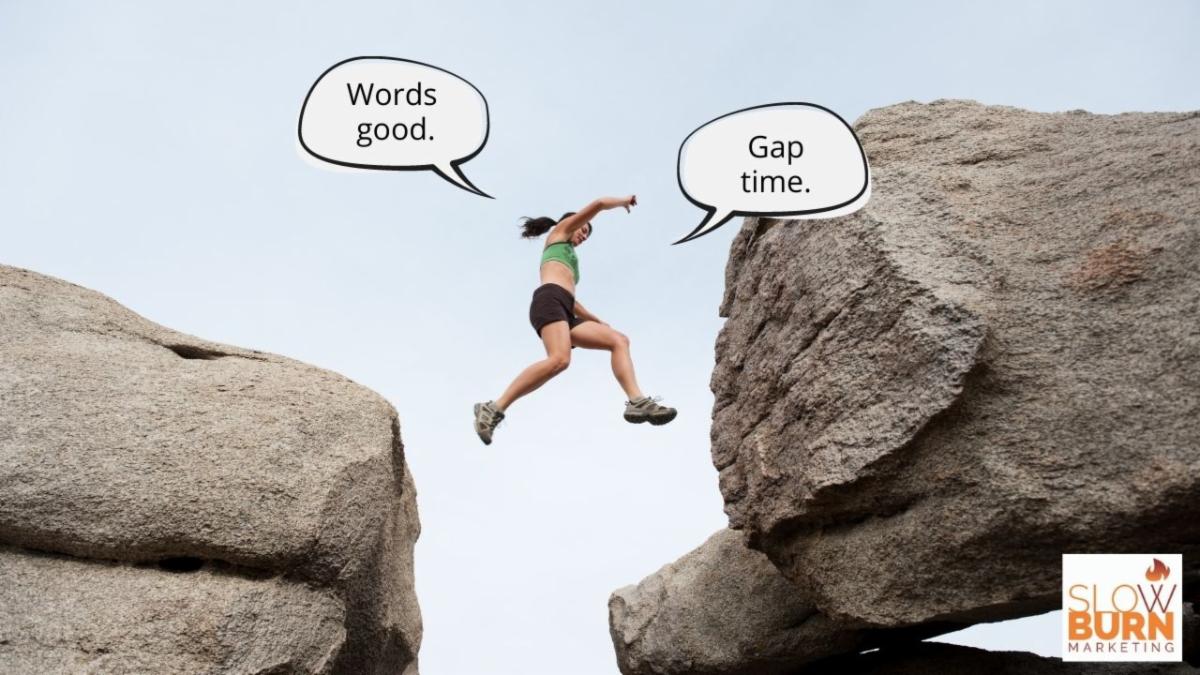
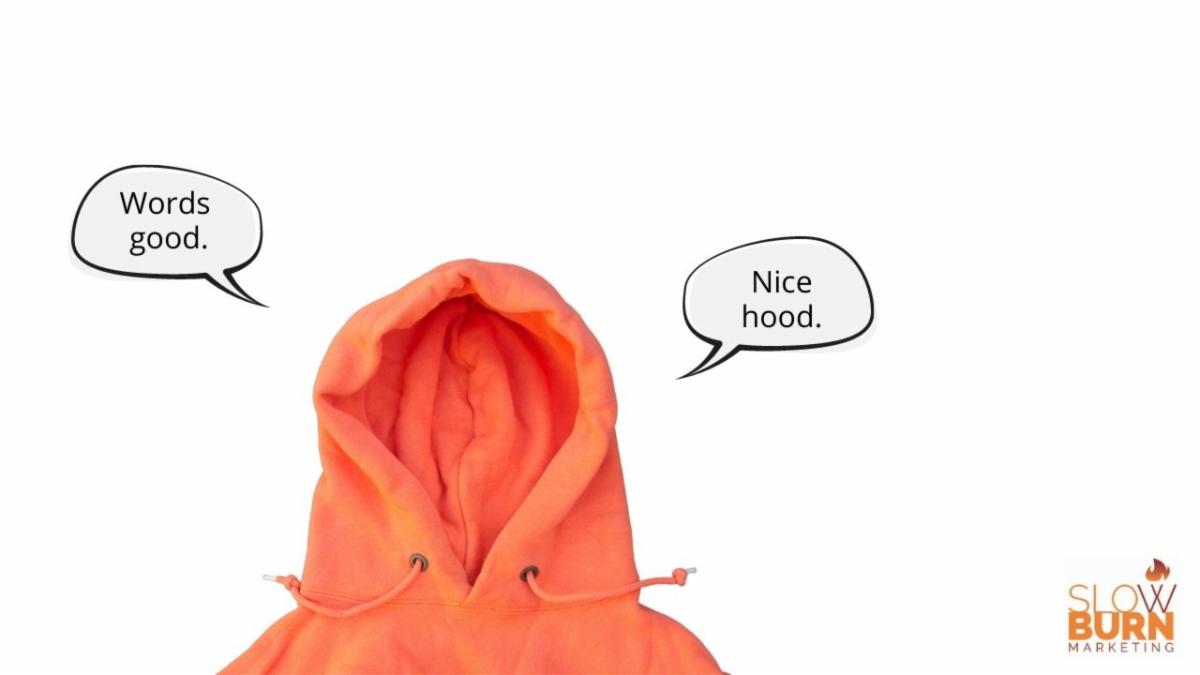
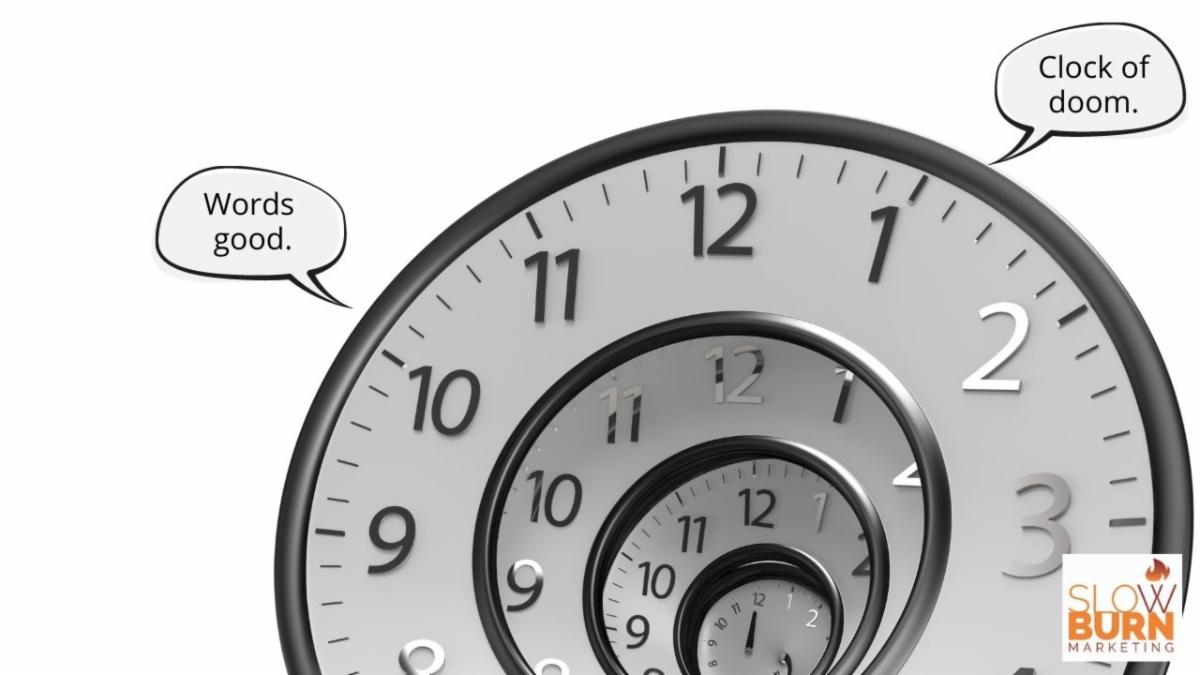
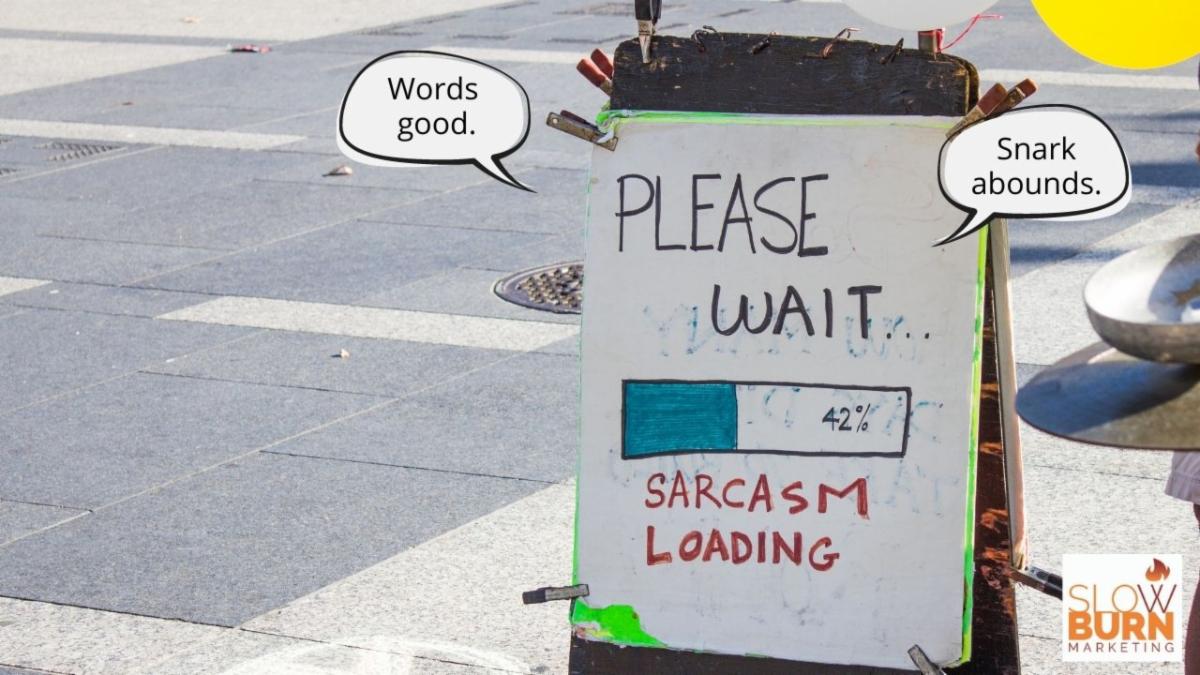
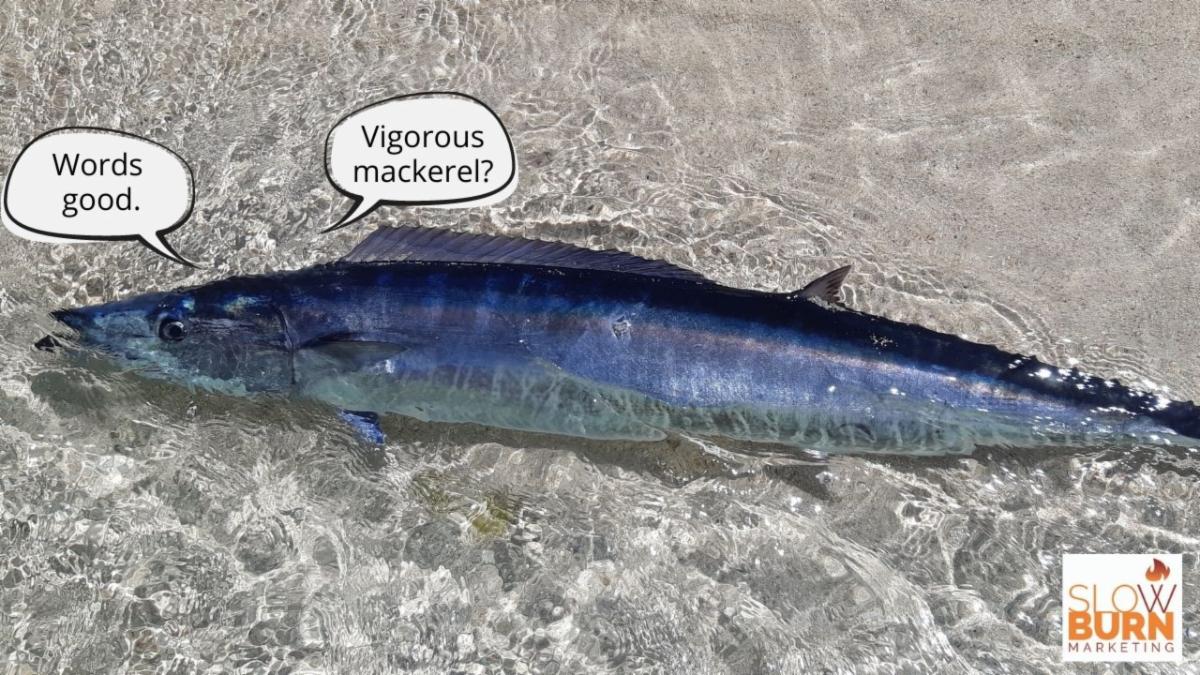
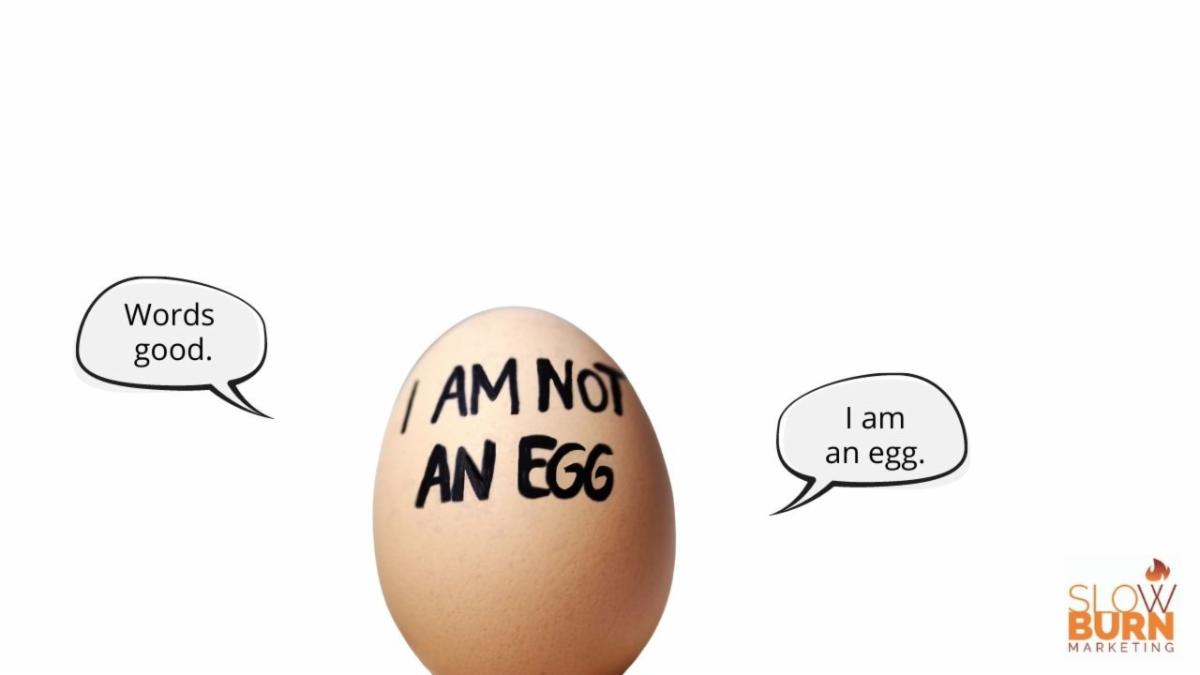
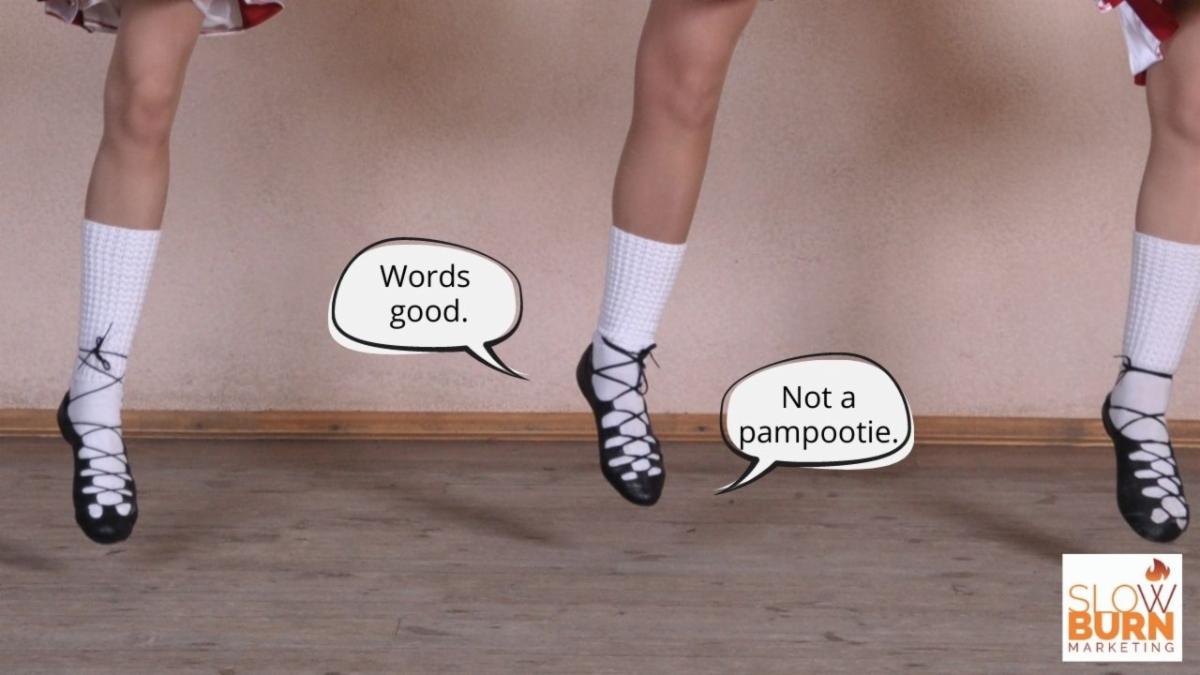
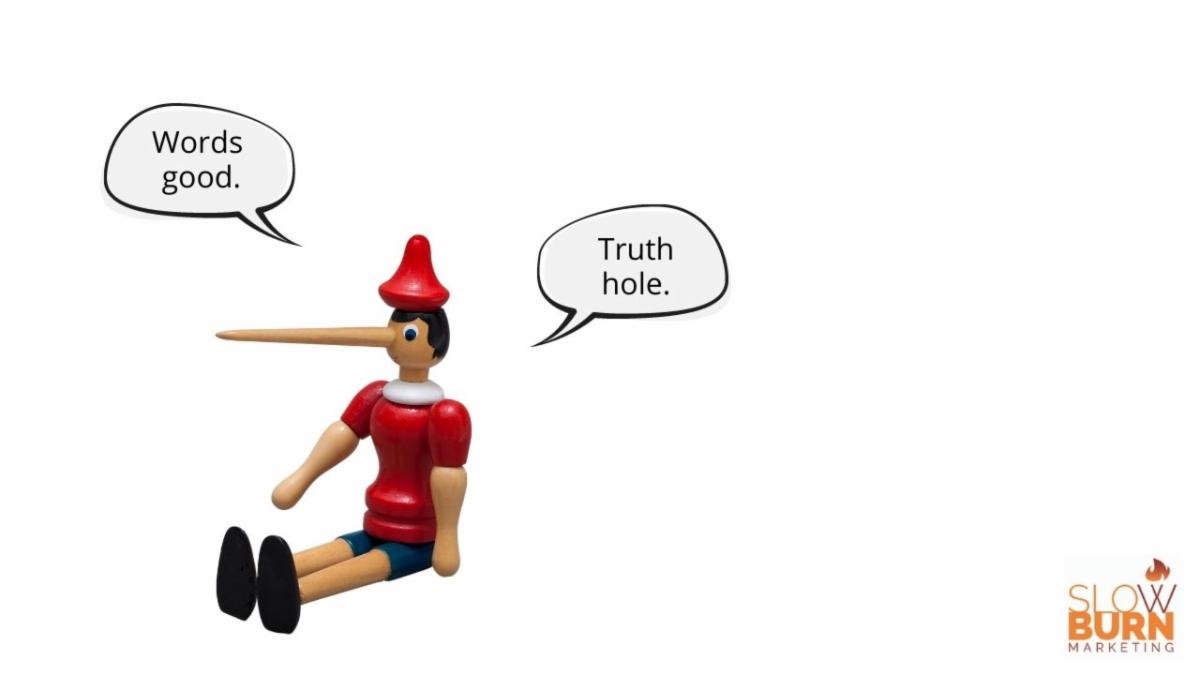
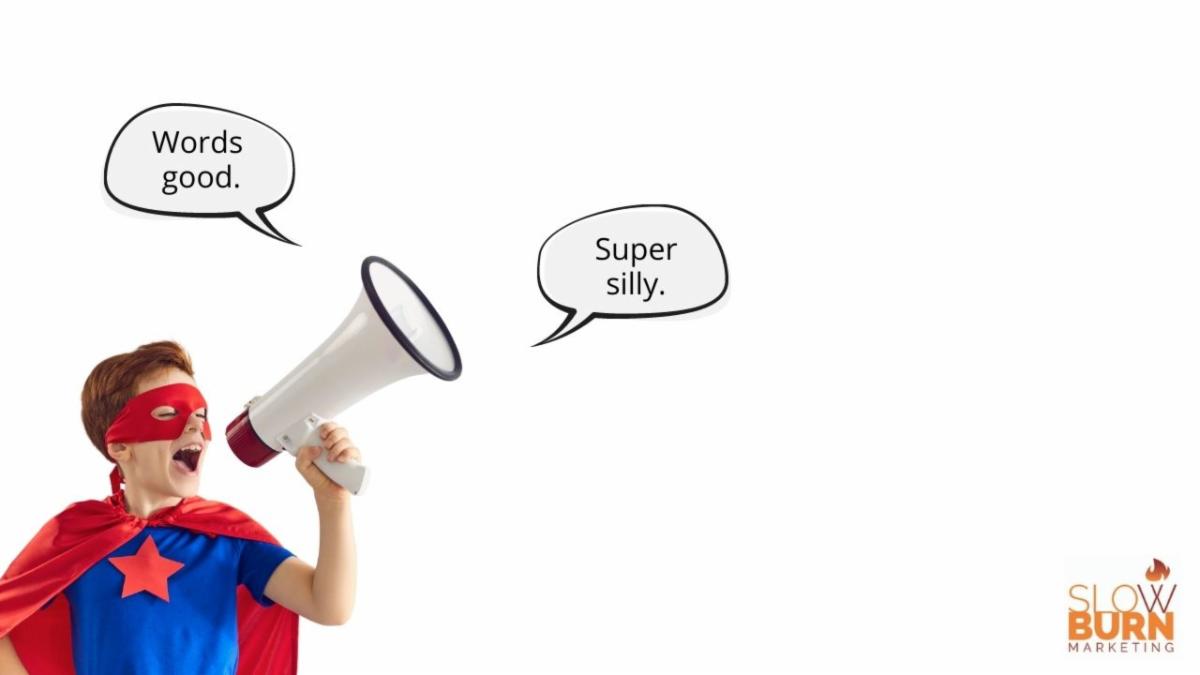
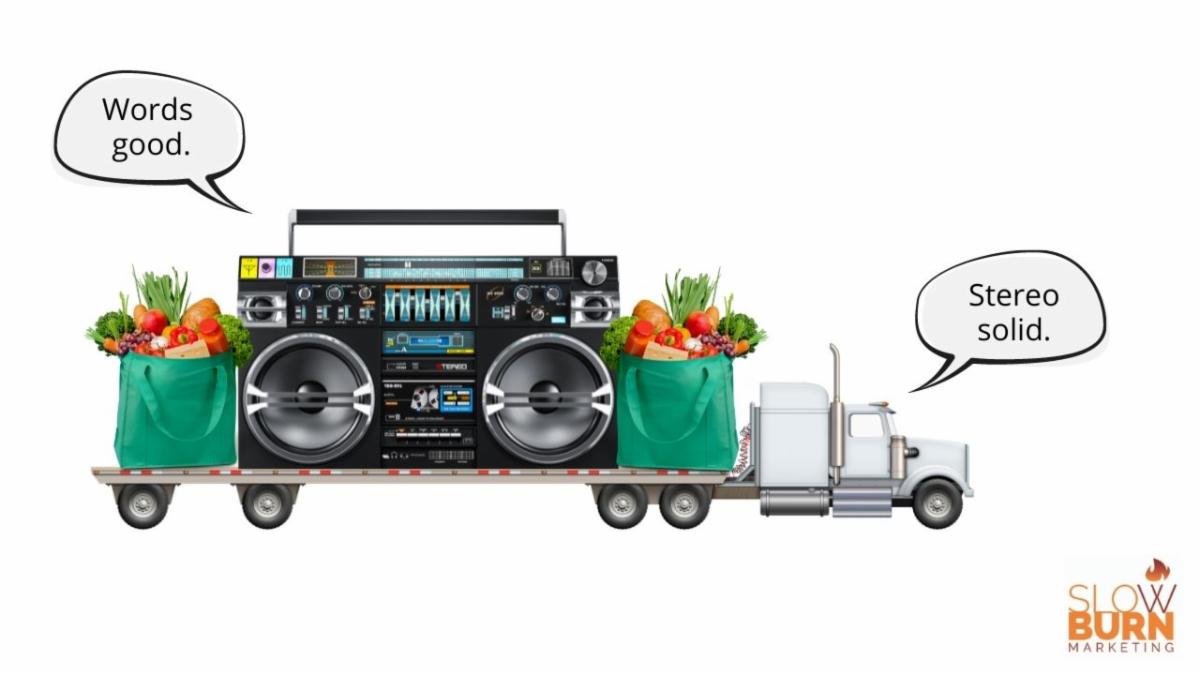
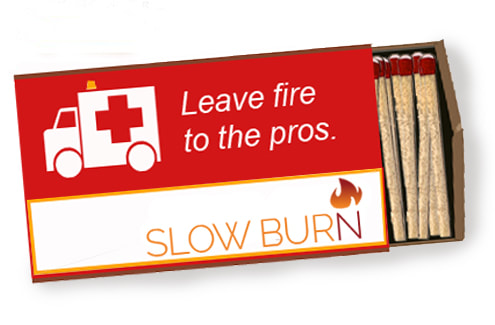
 RSS Feed
RSS Feed

